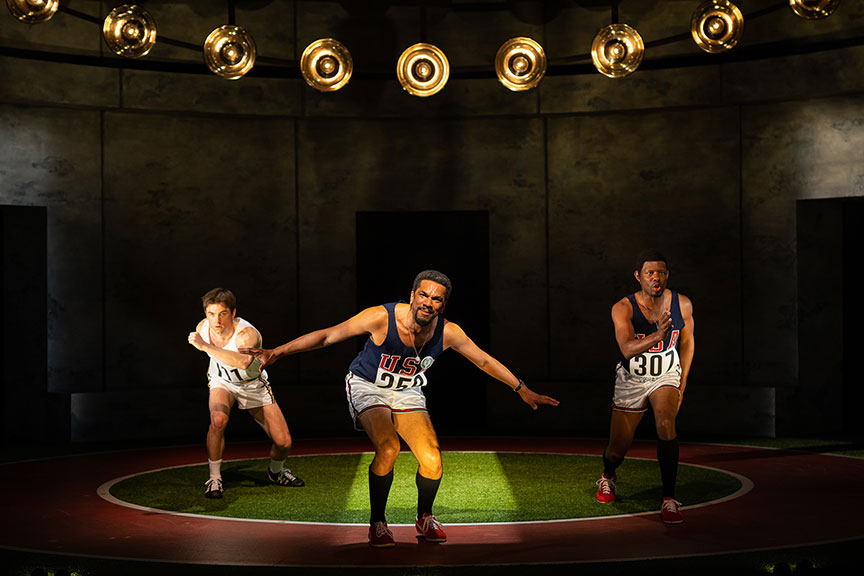The three protagonists, mid-race, frozen, as Biko Eisen-Martin as John Carlos shares his story in a monologue.
The Old Globe’s The XIXth wins the gold
New play blends arts and sport in San Diego
April 10, 2023
It’s not often that two distinct worlds collide, but The XIXth, The Old Globe Theater’s current mainstage show, brings sports fans and theatre lovers knee-to-knee. The show, written by the writer of Pixar’s Soul, Kemp Powers, is having its world premiere in San Diego, but its witty commentary on the media and the history of the Olymic Games is sure to delight audiences across the country, and perhaps across the world.
The 105-minute play opens on a semi-circle stage set up as a field, and eventually the full circle, complete with a rotating running track is revealed. The plot is nonlinear, and jumps across a couple of timelines, but focuses on the 19th Olympic Games, held in Mexico City. Tommie Smith and John Carlos (played by Korey Jackson and Biko Eisen-Martin respectively) lead most of the vignettes, but their dialogue is interspersed with clips of news audios from the 60s, filling in all transition space. Mostly, the show is about the conversations before the medal ceremony, and the decision Carlos and Smith made to go barefoot and raise their black-gloved fists on the podium.
The story jumps, capturing their rivalry and friendship, as well as their frustrations as Black athletes during the time. Through talks with the director of the International Olympic Committee and Jesse Owens (Michael Early), Carlos starts to contemplate a protest at the big games, which centers the plot. In meeting the only other on-stage competitor, Peter Smith (Patrick Marron Ball), the characters deftly move through a ton of history, cracking jokes at the audience along the way. Many audience members seemed to enjoy John Carlos’ spunk, and the specific sports references uncommon in most plays.
The conversation about sports recruitment remains relevant today, with articles written frequently about predominantly white institutions using Black athletes for profits and diversity initiatives. The US News and World Report even published a list of “Top Colleges Accused of Violating Black Athletes’ Rights” last year, regarding the underpaying of athletes. The character of John Carlos says, at one point, “here we are running for glory and awards from the very same government that’s oppressing us” and this seems to ring true for many athletes across the country.
Although the set is minimal, a giant Olympic sign descends, setting the tone of excitement for the show’s climax, and the rotating stage adds to the feeling of movement during the big race. The track is also simple enough to be used in some of the other scenes, becoming the carpet for the office of the head of the Committee and the floor under the casket for funeral scenes. The lighting is simple but powerful and focuses the story during monologues. Although there were a few microphone stumbles, tech was seamless and professional overall. The sound design was super successful, adding a throughline that eventually tied into The XIXth’s themes.
Most of the dialogue revolves around the runners’ personal sacrifices ahead of the protest during the race, and the pressure to conform behind the scenes. It’s about nuanced allyship, and the efforts bigger organizations make to keep victims quiet. There are also California-specific references, calling out traditions of share-cropping and modern-day slavery. Power’s writing is unflinching, an untraditional combination of sports, art, and social commentary.
An interesting alternate plot was about the influence of the press. Clips of interviews between the media and Carlos and Smith show their answers getting twisted in real-time. Eventually, the media ruins their friendship, and the story is misconstrued beyond recognition. The shouting of anchors played during transitions underscores this, the disapproval of the protests heard (literally) loud and clear.
The audiences at The Old Globe transform and blend into the audience for the Olympics, stretching across decades to witness the events together. Although “politics are supposed to be kept out of sports” as one of the white characters says, The XIXth does not follow those rules. Politics, sports, arts, social commentary, and activism come together in this show about friendship, advocacy, and finding the truth. The XIXth runs at The Old Globe until April 23rd.


